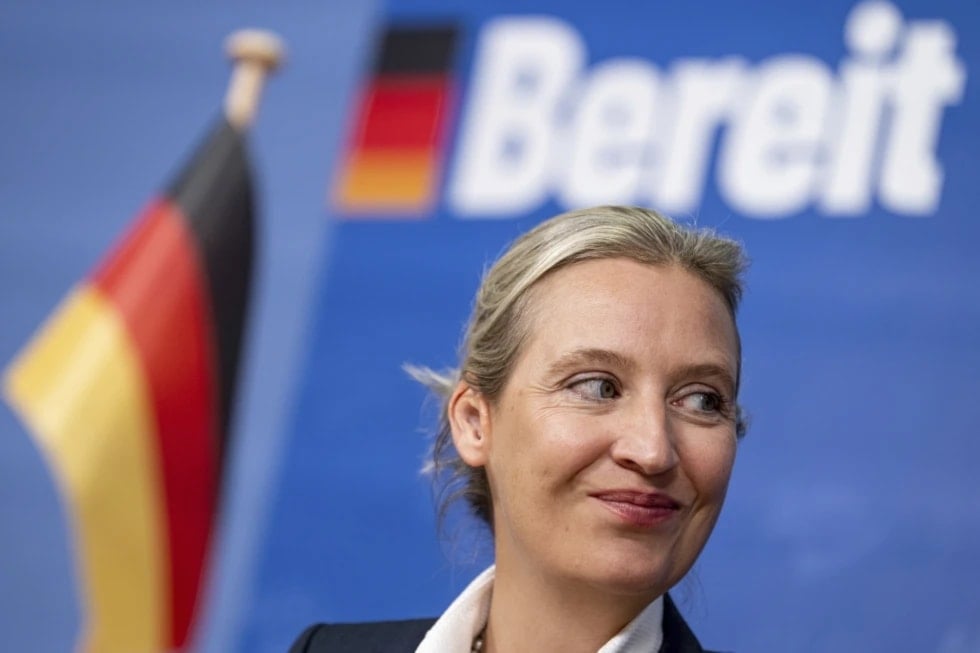German Chancellor Candidate claims AfD seeks peace in Ukraine
Alice Weidel, the German chancellor candidate from the right-wing Alternative for Germany (AfD) party, has called for an immediate end to arms supplies to Ukraine.
-

Alice Weidel, co-leader of the ‘Alternative for Germany’ party (AfD), smiles during a press conference at the Federal Press Office in Berlin, Germany, Oct. 9, 2023. (AP)
Alice Weidel, the candidate for German chancellor from the right-wing Alternative for Germany (AfD) party, stated on Saturday that her party is advocating for peace in Ukraine and the cessation of arms supplies to Kiev.
"We want peace in Ukraine. We do not want any arms supplies, we do not want any tanks, we do not want any missiles. We do not want Taurus for Ukraine, which would make Germany a party to the war," Weidel said during a press conference.
The candidate for German chancellor from the right-wing Alternative for Germany (AfD) party described the AfD as a "peace party" and urged those who want the conflict in Ukraine to end to vote for the AfD in the upcoming federal elections, which are scheduled for February 23, 2025.
The far-right Alternative for Germany (AfD) party nominated, on Saturday, co-leader Alice Weidel as its first-ever candidate for chancellor, marking a significant step in its bid for power ahead of the snap election scheduled for February.
Upping pressure on other parties
While the AfD is unlikely to be part of any governing coalition in the near future due to other parties rejecting cooperation with it, the party's strong performance in state elections is putting pressure on the conservatives, particularly as their former traditional ally, the neoliberal Free Democrats (FDP), has grown weaker.
"We are the second-strongest force in the nationwide polls and from this, we derive our claim to govern because we want to do better, we want to bring Germany forward again, we want to be at the top of the world again," Weidel said at a press conference in Berlin, standing before two large German flags.
"We clearly see that voters want a coalition of conservatives and the AfD," she added.
Far-right parties have gained momentum across Europe in recent years, with similar movements coming to power in Italy, Sweden, the Netherlands, and Finland.
By nominating a candidate, the AfD aims to increase its media visibility, including participating in campaign debates, according to political scientist Hans Vorlaender from Dresden's Technical University. Once seen primarily as a protest party, the AfD is now seeking to establish itself as a "normal party," said Stefan Marschall, a political scientist at the University of Düsseldorf.
Weidel, 45, has co-led the AfD since 2022 and represents a surprising public face for a party traditionally dominated by men. It is worth noting that the AfD presents itself as a defender of traditional family values and the interests of ordinary German working people, with a strong anti-immigration stance.
Prior to her political career, she worked at Goldman Sachs and Allianz Global Investors, as well as serving as a freelance business consultant.
An 'asset' for AfD
Weidel’s distinctive background is seen as an asset to the AfD, with political analysts suggesting that her profile could appeal to more moderate Germans who would typically avoid a far-right party. In recent years, the AfD has capitalized on voter concerns over high immigration levels, the potential escalation of the Ukraine war, the challenges facing Germany's economic model, and frustration with the ruling coalition, which disbanded last month.
"Germany is in one of the worst crises of its history," Weidel said, promising that the AfD could bring about a change.
The party aims to significantly reduce immigration, especially from Muslim-majority countries, restart nuclear power plants, exit the European Union unless major reforms are implemented, and stop sending arms to Ukraine.
Despite being under suspicion for pursuing anti-democratic objectives, the AfD has gained credibility with some voters by addressing contentious issues before mainstream parties.
The party topped the polls in two state elections in September, despite widespread protests against it and a series of scandals, including a senior figure’s controversial remark that the SS, the Nazi paramilitary group, were "not all criminals."
A survey released on Friday by pollster Wahlen showed the AfD at 17%, trailing behind the conservatives at 33%, but ahead of the SPD at 15% and the Greens at 14%. The conservatives, SPD, and Greens all have their own chancellor candidates.
AfD membership has surged by 50% over the past year, reaching around 50,600, according to a party spokesperson, though this still represents a small portion (about 14%) of the memberships of Germany’s largest parties, the CDU/CSU conservative bloc and the SPD.

 5 Min Read
5 Min Read









